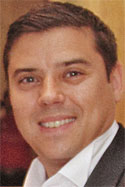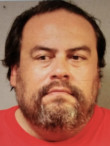Mark Scott & Sebastian Greenwood lose OneCoin appeals
 Sebastian Greenwood and Mark Scott have lost their respective OneCoin criminal sentencing appeals.
Sebastian Greenwood and Mark Scott have lost their respective OneCoin criminal sentencing appeals.
OneCoin co-founder Sebastian Greenwood (right) was sentenced to twenty years in prison in September 2023.
 Greenwood (right) filed an appeal against the sentence in November 2023.
Greenwood (right) filed an appeal against the sentence in November 2023.
OneCoin money launderer Mark Scott was sentenced to ten years in prison in January 2024. Scott filed an appeal against the sentence in April 2024.
The Second Circuit published a summary order pertaining to both appeals on January 31st, upholding both sentences.
Summarizing Greenwood’s and Scott’s appeal arguments, the Second Circuit wrote;
On appeal, Greenwood argues that
(1) the district court erred by calculating his sentence based on both domestic and foreign losses of the OneCoin scheme, and
(2) his sentence was substantively unreasonable.
Scott argues that
(1) the district court abused its discretion by denying his motion for a new trial based on the per jury of a government witness,
(2) the district court abused its discretion by excluding certain evidence,
(3) the government failed to produce sufficient evidence to prove the charge of conspiracy to commit bank fraud, and
(4) the government failed to produce sufficient evidence to prove the charge of conspiracy to commit money laundering and his sentence impermissibly reflects extraterritorial conduct.
Sebastian Greenwood’s arguments
The Second Circuit found while Greenwood’s OneCoin scamming outside of the US might not qualify as “the offense of conviction”, nonetheless it qualified as “relevant conduct” towards sentencing.
With respect to Greenwood’s sentencing being unreasonable, the Second Circuit found
the district court did not abuse its discretion by imposing a sentence of 240 months of imprisonment.
Mark Scott’s arguments
 The Second Circuit found the District Court did not abuse its discretion in denying Scott’s motion for a retrial.
The Second Circuit found the District Court did not abuse its discretion in denying Scott’s motion for a retrial.
To recap, Scott’s retrial motion was brought forward on the basis interim OneCoin CEO Konstantin Ignatov perjured himself on the stand.
The district court did not abuse its discretion by denying Scott’s motion for a new trial based on Konstantin Ignatov’s testimony regarding how he disposed of his laptop in 2019 or his testimony regarding Irina Dilkinska’s presence at a meeting.
There was no “reasonable likelihood” that the testimony affected the judgment of the jury.
Konstantin’s testimony that he was “pretty sure” but not “a hundred percent sure” that Dilkinska was present at the meeting with Scott and Ruja Ignatova in July of 2016 was not shown to be perjurious but, even if it had been, that showing would have “merely furnishe[d] an additional basis on which to impeach a witness whose credibility ha[d] already been shown to be questionable.’”
As the district court observed, Scott’s “extensive impeachment” of Konstantin “on much more significant topics more relevant to the jury’s determination of Scott’s guilt” meant that evidence undermining Konstantin’s testimony about the meeting “would, at most, have been cumulative impeachment material.”
The district court also did not commit a reversible error by excluding the emails regarding Konstantin’s perjury or by declining to hold an evidentiary hearing on the perjured testimony.
With respect to the District Court “excluding certain evidence”, the Second Circuit found;
The district court did not abuse its discretion by excluding certain emails as hearsay or by quashing the subpoena of Neil Bush.
The emails that Scott sought to introduce qualified as hearsay. Contrary to Scott’s argument, these emails were not evidence of Scott’s “then-existing state of mind” … but of the partner’s purported understanding of OneCoin’s business practices.
Nor did the district court abuse its discretion by quashing the subpoena of Neil Bush.
As the district court noted, evidence of Bush’s involvement in the CryptoReal transaction was already presented to the jury.
Bush’s testimony could not have provided any evidence of Scott’s understanding of the legitimacy of the CryptoReal transaction because Bush and Scott never met.
On Scott arguing “the evidence was insufficient to support his conspiracy to commit bank fraud conviction”;
The government sufficiently proved the centrality of domestic use of wires to the money-laundering schemes.
The jury saw evidence that OneCoin targeted investors in the United States—including emails between Ruja Ignatova and Scott regarding how to structure OneCoin’s American business — and heard the testimony of two American victims concerning the wire transfers they made from their American bank accounts, the promoters in the United States who introduced them to OneCoin, and their losses from their investments in OneCoin.
Specifically addressing Scott’s argument that most of the losses incurred by his scamming occurred outside of the US;
First, that only a portion of the overall losses were suffered by American victims does not render the scheme extraterritorial.
As the district court correctly noted, there is no requirement that a court “parse the percentage of fraudulent proceeds obtained in the United States, as compared to abroad.”
Second, the government was not required to prove that the specific money obtained from American victims was eventually transferred into the funds … but it nevertheless provided such proof.
And finally, on Scott’s argument there was insufficient evidence to support his conspiracy to commit bank fraud conviction;
There was sufficient evidence to support Scott’s conviction for conspiracy to commit bank fraud.
Addressing the rest of Greenwood’s and Scott’s arguments, the Second Circuit concluded;
We have considered Greenwood’s and Scott’s remaining arguments, which we conclude are without merit.
For the foregoing reasons, we affirm the judgments of the district court.
Greenwood is currently incarcerated at FCI Danbury in Connecticut, with a November 15th, 2035 release date (note reduction for time served and other adjustments).
Mark Scott was released on bail in April 2024, pending the outcome of his appeal.
Now that Scott’s appeal has been denied, it’s expected he will be ordered to report to BOP officials to commence his sentence.


Things just keep looking worse for OneCoin. Good to see!
I found the following message on facebook saying Boris CEO Ventsislav Zlatkov was fired from Onecoin:
This was also published today on oneecosystem.eu.
postimg.cc/c6K4Wnb2
oneecosystem.eu/news/3i9q1u77fcmnq1i
Translation of the above statement:
Under the leadership of CEO Ventsislav Zlatkov membership continued to tank, the number of merchants continued to tank, and we are hoping a new sucker, err patsy, err stooge, err leader will emerge and hopefully keep us afloat for another 6 months to give us time to hide all the remaining money from the membership and merchants for ourselves.
And of course a new CEO wasn’t announced. They just leave.
Panamanian scammer Erick Rueda claims the new CEO is Mai Loan from Vietnam who doesn’t even talk english. 😀
youtu.be/ODm28UaIC5A
Is this video from October 22, 2024 credible?
postimg.cc/R3pk1Ypg
youtube.com/watch?v=Ausc6a6XLaM
It bothers me that Ventsislav Zlatkov‘s name has been misspelled.
The Facebook account “Ventsis Slatkov” with 5,853 followers. I think this account is a fake.
postimg.cc/B86SGk80
facebook.com/ventsislavzlatkovCEO/
At least when I got fired they held an emergency meeting in Sofia.
The US Federal Bureau of Prisons page shows Irina Dilkinska as no longer in custody.
Whether she’s being held by someone other than the BoP, got a free ride home and freedom, or has to serve time closer to her family and friends in Bulgaria, is unclear. She won’t be held in Bulgaria and unconfirmed word is that she’s back in Sofia